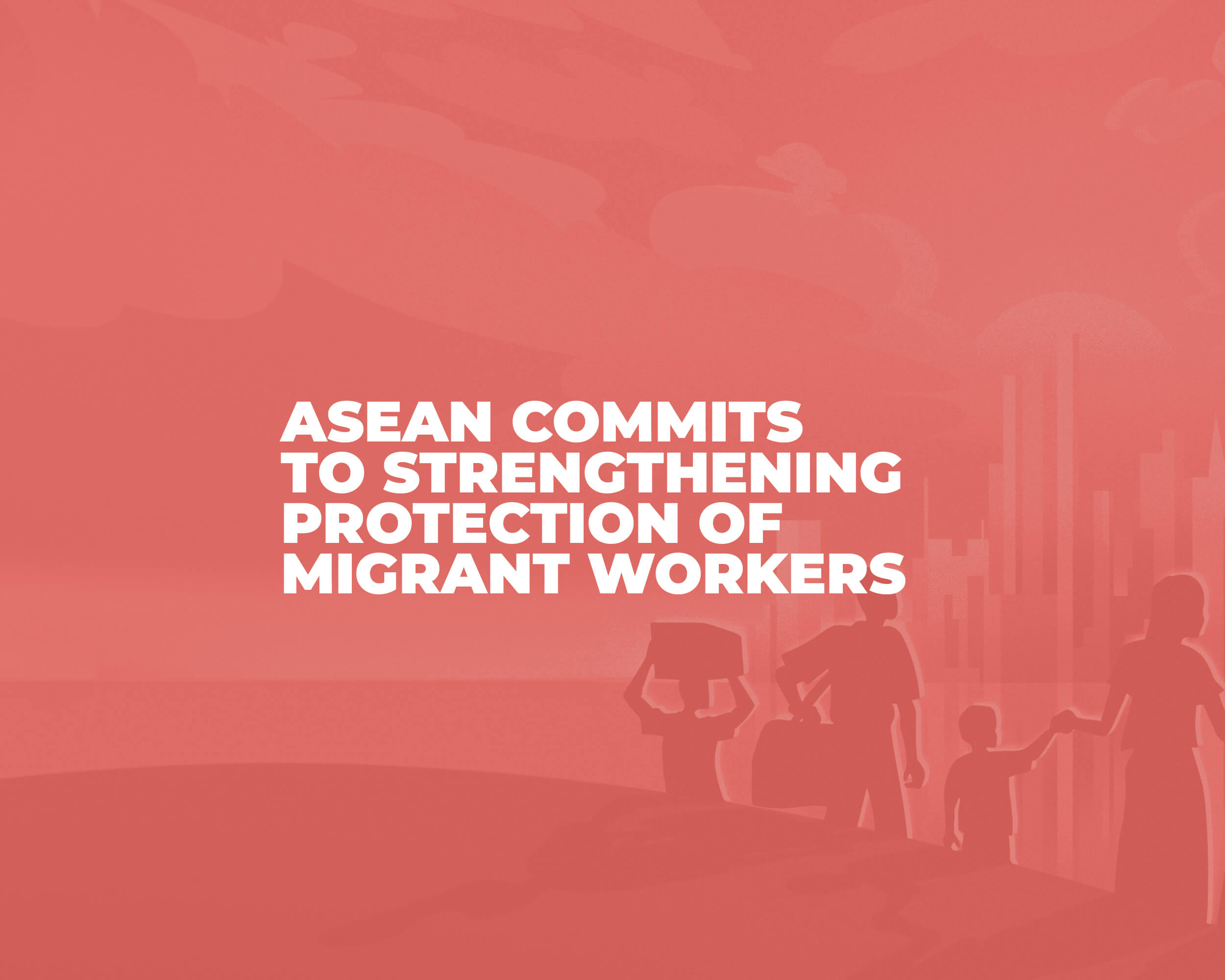



Migrant workers are an integral part of the ASEAN Community, contributing to the economic and social development of both their countries of origin and destination. However, they also face many challenges and risks, such as exploitation, discrimination, and lack of access to social protection. To address these issues, ASEAN has placed the well-being of migrant workers high on its policy agenda.
ne of the key milestones was the signing of the ASEAN Consensus on the Protection and Promotion of the Rights of Migrant Workers by the ASEAN Leaders in 2017, which specifies the fundamental rights of migrant workers, such as fair treatment, decent work conditions, and access to justice. It also lays down the shared responsibilities of both sending and receiving states in the migration process. ASEAN also adopted the ASEAN Guidelines on Effective Return and Reintegration of Migrant Workers in 2020, which provides for the economic and social reintegration of returning migrant workers through, among others, basic training in financial literacy and entrepreneurship. Another important initiative is the ASEAN Declaration on Portability of Social Security Benefits for Migrant Workers in ASEAN, which opened the way for Member States to forge bilateral or multilateral agreements for the cross-border transferability of migrant workers’ social security benefits.
At the 42nd ASEAN Summit held on 10 May 2023 in Labuan Bajo, Indonesia, the ASEAN Leaders adopted two more important declarations that aim to improve the safety of millions of migrant workers in the region. One is the ASEAN Declaration on the Protection of Migrant Workers and Family Members in Crisis Situations, and the other is the ASEAN Declaration on the Placement and Protection of Migrant Fishers.
ASEAN Declaration on the Protection of Migrant Workers and Family Members in Crisis Situations
The Declaration recognises the need to provide humanitarian assistance to all migrants and their family members—regardless of their legal status— during crisis situations. It encourages the ASEAN Member States to include migrant workers and their families in all stages of crisis management and ensure they have access to continuing support.
The following are the specific commitments:
- Adapt policies to include assistance to migrant workers across occupational areas at all stages of crisis preparedness, response, and recovery for the specific needs of migrant workers, especially women, and their families already residing with them in crisis situations;
- Mainstream the protection and promotion of the rights of migrant workers caught in crisis situations and their family members left behind in the policies, programmes, and mechanisms of sending states;
- Facilitate access of migrant workers to timely and relevant information and support services in times of crises;
- Support access to justice, grievance mechanisms and referral and support mechanisms to address various forms of harm and exploitation experienced by migrant workers in crisis situations;
- Facilitate, where relevant, timely access of all migrant workers affected by crises to sustained safety, health care, psychosocial support, social protection, livelihood support in time of furlough, sickness or injury, and return and reintegration to their countries of origin;
- Strengthen bilateral and/ or multilateral cross-border coordination between countries of origin, transit, and destination authorities in assisting and protecting migrant workers and their family members already residing with them in crisis and preventing them from becoming undocumented or being the victims of trafficking in persons;
- Strengthen cooperation to extend assistance to migrant workers of ASEAN Member States who are caught in crisis situations outside ASEAN in the event of need, based on the capacities and resources of the Embassies and Consular Offices of the relevant ASEAN Member States and based on bilateral consultations and arrangements;
- Promote whole-of-society and whole-of-government collaboration and partnership between ASEAN Member States and ASEAN’s external partners, international organisations, and other relevant international entities to better protect migrant workers and their family members already residing with them in crisis situations throughout the entire migration process;
- Cooperate and coordinate among ASEAN Member States to extend humanitarian assistance to migrant workers, irrespective of their legal status, and their family members who are already residing with them in the States where the crisis occurred.
ASEAN Declaration on the Placement and Protection of Migrant Fishers
The Declaration seeks decent work, human rights recognition, and social protection for migrant fishers in the region. It urges ASEAN Member States and relevant stakeholders to cooperate on migration data and law enforcement.
The following are the specific commitments:
- Consider mainstreaming the protection of migrant fishers in all relevant migration policies, mechanisms and processes of ASEAN and its Member States, including with those of ASEAN’s External Partners, international organisations, and other relevant international entities;
- Endeavour, where appropriate, to strengthen measures, in cooperation with the private entities, employers and other partners and dedicate resources to enhance the labour conditions of migrant fishers and ensure their labour rights protection, including but not limited to decent working and living conditions, occupational health and safety, risk evaluation, access to justice, access to social protection with special attention to the workers who are sick, injured or dead, including humanitarian assistance in case of health emergencies and crisis situations for fishers on board;
- Further endeavour to take appropriate and gender-responsive measures to identify, address and punish all forms of violence, abuses and exploitation against migrant fishers, including strengthening the institutional capacities and systems of labour inspections and referral systems, occupational safety and health, accident prevention, workplace injury, grievance mechanisms, and to improve inter-agency coordination and labour inspection to effectively protect migrant fishers;
- Improve the entire migration process of migrant fishers through improvement in ethical and fair recruitment and placement; pre-employment, pre-departure and post-arrival orientations; and access to employment contracts or proper documentation in the language they understand;
- Improve the protection of migrant fishers and their families left behind by ensuring their access to communications, access to information on migration policies, job risks and their rights, and right to any modes of transfer of wages and employment benefits to their families;
- Encourage ASEAN Member States to initiate or conclude bilateral agreements among each other and with countries outside the region to facilitate safe and regular migration of migrant fishers especially in recruitment and placement processes, safe repatriation and reintegration, and access to justice and remedies;
- Explore cooperation among ASEAN Member States on data collection and sharing on, but not limited to, case management, recruitment and repatriation of migrant fishers in and outside of ASEAN, and sharing of best practices and lessons learned in the migration process of migrant fishers;
- Promote collaboration and partnerships between ASEAN Member States and with relevant ASEAN external partners, international organisations and other regional and national stakeholders for more effective law enforcement and in protecting ASEAN migrant fishers in the entire migration process.








